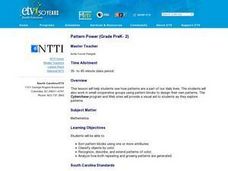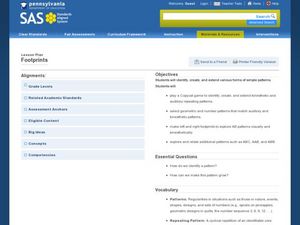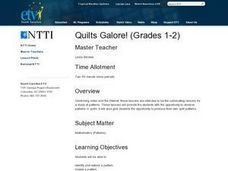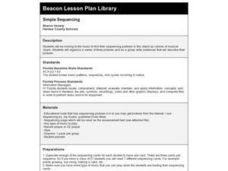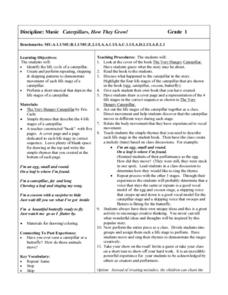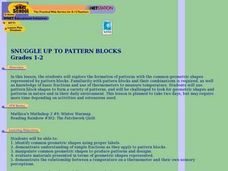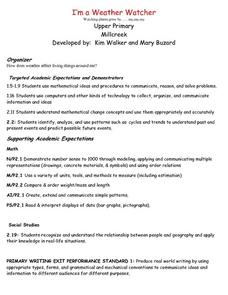Curated OER
Pattern Power
Young elementary students will discover there are patterns all around them in their daily lives. In groups, they sort pattern blocks by size and color. Using the internet, they create their own type of patterns and share them with the...
EngageNY
Why Do Banks Pay YOU to Provide Their Services?
How does a bank make money? That is the question at the based of a instructional activity that explores the methods banks use to calculate interest. Groups compare the linear simple interest pattern with the exponential compound interest...
Curated OER
Investigation - Patterns
Students create a pattern out of pattern blocks. In this math lesson, students work with a partner to investigate the pattern they have. Within that group, students continue to design the pattern by adding the next two pieces....
Curated OER
It Just Keeps Going and Going...
Students explore patterns, identify patterns, and complete a variety of patterns. They view and discuss an online video and identify the different patterns from the film, then using a hundreds grid create an original pattern using their...
Curated OER
National Symbol Patterns
Students practice their patterning skills using national symbols.
Inside Mathematics
Hexagons
Scholars find a pattern from a geometric sequence and write the formula for extending it. The worksheet includes a table to complete plus four analysis questions. It concludes with instructional implications for the teacher.
Curated OER
Footprints
Students explore patterns. For this patterns geometry lesson, students identify and extend patterns including body parts, movement, geometric shapes, noises, and footprints. Students create and share an original pattern.
Curated OER
Quilts Galore
Students explore patterns. They observe a video, "Math Monsters." Students determine the next item in a sequence. Students read books about patterns. They discuss patterns in quilts. Students visit a specified web site and design...
Inside Mathematics
Conference Tables
Pupils analyze a pattern of conference tables to determine the number of tables needed and the number of people that can be seated for a given size. Individuals develop general formulas for the two growing number patterns and...
Curated OER
The Celts
Look far back in history and you'll meet a people group called the Celts. Celts, as you'll soon find out, are a group of people who inhabited Britain 2000 years ago. Presented here, is simple information which describes a bit about...
Public Schools of North Carolina
Math Stars: A Problem-Solving Newsletter Grade 2
Develop the problem solving skills of your young learners with this collection of math newsletters. Covering a variety of topics ranging from simple arithmetic and number sense to symmetry and graphing, these...
Curated OER
Crystal Growing
Students explore the different phases of a crystal. In this mineral lesson students grow their own sugar crystals using a sugar recipe.
Curated OER
National Symbol Patterns
Students discuss and create their own patterns. They practice and improve on making patterns of their own using red, white, and blue paper for a national theme. The symbols are based on what the teacher picks for the class.
Curated OER
Simple Sequencing
Fourth graders play a stand up version of musical chairs to find their sequencing partners. In this music and language arts activity, 4th graders enjoy a game that requires them to organize a series of three pictures, then write...
Curated OER
Music: Caterpillars, How They Grow!
Put on some music and get moving as a way to represent the life cycle of a caterpillar. Kids listen to the story The Very Hungary Caterpillar, discuss the life cycle, then create vocal expression that represent each stage of the cycle....
Curated OER
Describing an Object's Position
Students explore language arts by participating in a shape identification activity. In this geometry shape lesson, students discuss the vocabulary terms used to describe the location of an object. Students complete a worksheet based upon...
Curated OER
Be Sharp and Never Flat
An outstanding lesson on music awaits your young composers! They learn about patterns found in music, the different sections of an orchestra, and see the differences between musicians and a composer. Excellent streamed videos and good...
Curated OER
Snuggle Up To Pattern Blocks
Students view and discuss a video about the use of pattern block shapes to form pictures. They, in groups, form garden and quilt designs using pattern blocks and then decorate the room with their art.
Curated OER
I'm a Weather Watcher Watching plants grow by......my,my,my
Students investigate how weather affects how plants grow. They collect data on weather and plant growth for a week and display the data on a graph. For a culminating experience they design a movie using software that shows plant growth...
Virginia Department of Education
Weather Patterns and Seasonal Changes
Get your class outside to observe their surroundings with a instructional activity highlighting weather patterns and seasonal changes. First, learners take a weather walk to survey how the weather affects animals, people, plants, and...
Virginia Department of Education
Cell Division
Searching for simple ways to teach mitosis to high schoolers? Using colored chalk and onion root tips, pupils visually demonstrate what they view when looking through the lens of a microscope. There are also various ways to expand the...
Curated OER
How Fast Does This Tree Grow?
Pupils work together to determine how fast trees go. They make predictions and complete simple measurements. They answer questions to end the instructional activity.
Hawaiʻi State Department of Education
Ostinato
Quarter notes, eighth notes, and rests; it's time to read rhythmic patterns in music. The class plays ostinatos as they practice identifying rhythmic patterns. They then listen to Mannheim Steamroller as they draw geometric patterns that...
Curated OER
Investigation - Looking For Triangles
Seventh graders investigate a series of triangles, looking for patterns and generalizing what they have found. They analyze the pattern data and organize it into a table and graph. Students identify the relationship and discover the rule...


